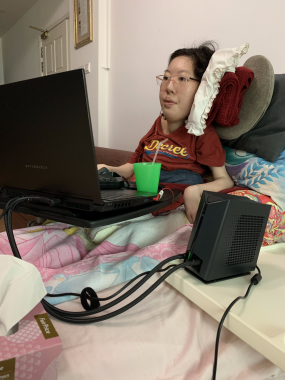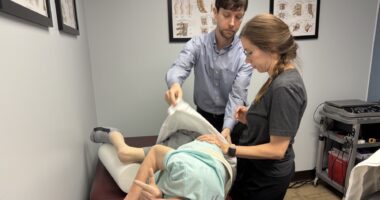In Case You Weren’t Aware, SMA Can Cause Trauma and Grief


Note: This column includes thoughts about suicide. Resources for help are listed at the end of the column.
On a brown and white display cabinet in my living room are two framed pictures of me. One was taken in a professional studio when I was about 6 years old. I’m wearing a smile with missing teeth, my favorite pink princess dress, and a tiara. The other was taken a year or two later, when I’m sitting on a white horse, wearing a helmet and pink shirt. (Can you tell I loved pink?)

(Courtesy of Sherry Toh)

(Courtesy of Sherry Toh)
Complicated, tangled emotions rise in me whenever I look at the photos. There’s curiosity, because the memories I have of my childhood are blurry and vague today, at 23. I wonder what I must’ve talked and looked like to the people around me. There’s nostalgia, because who doesn’t want to go back to a time when things seemed simpler? And there’s a little pride, because that little girl in pink has come so far.
But above all, it’s grief that overwhelms me. Looking at those photos, then back at myself, I’m reminded how much my body and the world’s perceptions of me have changed. I was small as a child, sure, but I didn’t look like my skin was pulled tightly over my bones. I had a straight spine instead of a hunchback that could rival Quasimodo’s. My upper body and facial muscles functioned well. I felt and looked nondisabled most of the time — or, as some people call it, “normal.”
I don’t feel or look like that anymore. SMA took that from me. And as I’ve reiterated over and over in past columns, SMA is still taking, progressing untamed, like wild ivy. I can’t hold my head or body up on my own anymore, and my lack of strength is in turn causing my scoliosis to worsen.
Just weeks ago, I broke down because I couldn’t hold myself up when sitting. I felt so angry at my body and Singapore’s restrictions on which citizens can access Evrysdi (risdiplam), a disease-modifying therapy (DMT) that could reverse some of SMA’s effects on me. I wondered what the point of living was. I wanted to self-destruct. But since I couldn’t physically harm myself, the urge turned into wanting to ghost my friends and employment opportunities, as I believed they’d be better off without me. It took everything in me to take a break from communicating with my friends and co-workers before I did something I’d regret.
As my appeal to acquire the public financial assistance needed for Evrysdi drags on, I’m declining rapidly. When asked about the likelihood of my appeal being approved, healthcare providers told me the chance is slim, as the government typically requires improvements in “quality of life” that I can’t achieve due my stage of disease progression and regular BiPAP use. Palliative care and mental health counseling would instead be offered. In response, I’ll point out that a denial will condemn me to more trauma and grief over my body that no amount of care or counseling can alleviate.
The counterargument to my point is that Singapore’s healthcare system has limited resources. Officials thus want to give expensive DMTs to patients with the best chances of benefiting most from the treatments. Which is understandable! But then we must still define who is “worth” DMTs and what “benefiting” from them looks like.
“Benefiting” from Evrysdi, to me, is simply halting the progression of my disease in order to give me more time to eat, sit, breathe, play, and work independently — all things my adult peers with SMA have lost or are losing. To say witnessing their decline and mine is traumatic would be an understatement. I’m only alive because I didn’t have the physical capabilities to act on my suicidal ideation when I was at my lowest.
I’ve thought to myself, “If I’m not ‘worth’ public resources and they’re indeed limited, then why not give up all I’d otherwise use? It could be done faster than Thanos’ snap in Marvel’s “Avengers: Infinity War.” Because without Evrysdi, I’ll need significantly more healthcare and financial aid in time.

The hunchback that could rival Quasimodo’s is hidden by the pillows that could almost rival the Princess’ mattresses in “The Princess and the Pea.” I didn’t need them a year ago. (Courtesy of Sherry Toh)
My ordeal reminded me of Canada’s medically assisted death laws. According to The Guardian, disability activists expressed that certain cases “represent Canada’s failure to care for its most vulnerable citizens,” with activists citing systemic abuse, institutionalization, and a lack of housing, healthcare, and financial assistance as the reason disabled Canadians ended their lives. In other words, the patients behind those cases weren’t deemed “worth” Canada’s resources.
Public healthcare officials worldwide should recognize that when we disabled people are denied assistance for our needs, they are, even unintentionally, declaring what our “worth” is. That message poisons us. No one wants to die before they must, but if I’m ultimately denied access to Evrysdi and forced to suffer from weakening over years, no amount of palliative care or counseling will be a kindness to me.
If you are struggling with thoughts of suicide, please contact the Suicide Prevention Lifeline in the U.S. (988, or 988lifeline.org, available 24/7), Samaritans in the U.K (samaritans.org), or Samaritans of Singapore in Singapore (sos.org.sg).
Note: SMA News Today is strictly a news and information website about the disease. It does not provide medical advice, diagnosis, or treatment. This content is not intended to be a substitute for professional medical advice, diagnosis, or treatment. Always seek the advice of your physician or other qualified health provider with any questions you may have regarding a medical condition. Never disregard professional medical advice or delay in seeking it because of something you have read on this website. The opinions expressed in this column are not those of SMA News Today or its parent company, BioNews, and are intended to spark discussion about issues pertaining to spinal muscular atrophy.
The post In Case You Weren’t Aware, SMA Can Cause Trauma and Grief appeared first on SMA News Today.

